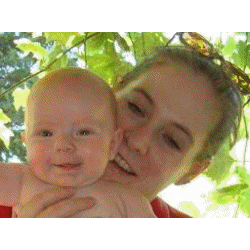“Are you still breastfeeding?”
Every woman who breastfeeds her children will, without fail, at some point be asked that very pointed question.
“Are you still breastfeeding?”
It almost doesn’t matter how long you’ve been nursing for: someone is going to ask. At three months? Six months? A year? Doesn’t matter. Someone will ask you.
Sometimes the subtext is awe: “Wow! You’re still nursing your babies! That’s great!“ Most times, however, the questioner asks in a most impatient manner. As if there’s a deadline to meet and you’re missing it. “What are you doing still nursing those babies?”
In my case, the fact that I decided to nurse the twins in the very first place was a big surprise. My doctor (For whom I have the greatest respect.) made it very clear that by nursing the twins full time, I’d be off in some exotic land where few women in our area had ever tread. Then again, I was apparently setting records for birth weights and length of gestation, so perhaps she wasn’t too surprised with my decision to breastfeed.
Nursing hasn’t always been Easy Street, either (See my rant from the first month if you don’t believe me.). Don’t get me wrong: once you’re in the groove, nursing is easy. It’s finding your groove and staying in it that are the hard parts.
When I started out, I wanted to tandem nurse the twins, get them on a schedule and possibly get a little more sleep. Well, it turned out that the twins had a touch of reflux and were tiny geysers of vomit on a very regular basis until they were about four months old. Thus, instead of tandem nursing, I was serially nursing twins to avoid at least some of the puke headed my way.
I’ve been bitten, pinched, pulled, vomited on, gotten plugged ducts, swollen and inflamed breasts from missing nursing sessions, Emma developed thrush, and Logan developed a preference for one side over the other.
Even with all of that, nursing has still been one of the best things I have done for the twins and for myself. Also? I produce a helluva lotta milk.
Now that we are tandem nursing, I get a bit more sleep at night. The weight loss aspect has been fabulous (I gained 65 lb for the pregnancy and by 7 months postpartum, it was gone. No exercise, just nursing and normal life with twins. I imagine that if you exercised, the weight would whip off even faster. I’m just lazy.). The twins are very snuggly when cuddled up and nursing together. Sometimes they reach over and pat the other twin. Of course, they also sometimes poke and pinch the other twin or attempt to steal the opposite breast, but life is tough around here.
Emma nurses more than Logan does, so when he finishes first, he sits up and smiles at me and we get a little extra bonding in: nose kisses, baby hugs, giggles. When he tires of me, I let him slide off my lap and crawl around the room. Emma and I then snuggle up together. She will finish off Logan’s breast (Because there’s always more milk in there.) and then crawl all over me like a puppy. She also engages in Nurse-robatics: standing up while nursing, twisting around, getting into Down Dog position, attempting to climb over my shoulder all while still engaged in lip-lock. Ouch! She also pats my tummy, plays with my hair and checks my teeth.
You know, just to make sure they’re still in there.
I respond by nibbling on her fingers and chewing on her neck, so I think we’re even.
Let me leave you with some of my hard-earned twin feeding tips:
5 Tips for Successfully Breastfeeding Twins
- Get a good book. I highly recommend Mothering Multiples: Breastfeeding and Caring for Twins or More! Read it. Ideally before the twins arrive.
- Be prepared to supplement with f*rmula. The biggest secret to nursing twins is to keep in mind that you may not have milk enough for two on the day they’re born. It took me a few weeks of pumping and supplementing with formula until my production increased enough to feed both of them fully. Be prepared to supplement and don’t beat yourself up over the fact that this, too, is another area where having twins is decidedly different from having a singleton.
- Herbal supplements are your friend! Herbal supplements like Alfalfa, Blessed Thistle and Fenugreek will help increase your milk production significantly. Trust me! Or if you don’t trust me, read up about it at KellyMom.com.
- Eat well. When breastfeeding twins, you’ll burn up about 1000 extra calories a day. You need to eat well to support your body’s ability to do that. Now is not the time to go on a diet to lose the pregnancy weight gain. It will come off. Be patient!
- Drink water. A lot of water. I’m not kidding. Why aren’t you drinking some water? Go get some!
Now when someone asks, “So are you still breastfeeding those twins?”
We’ll answer, “Hell yeah!“





